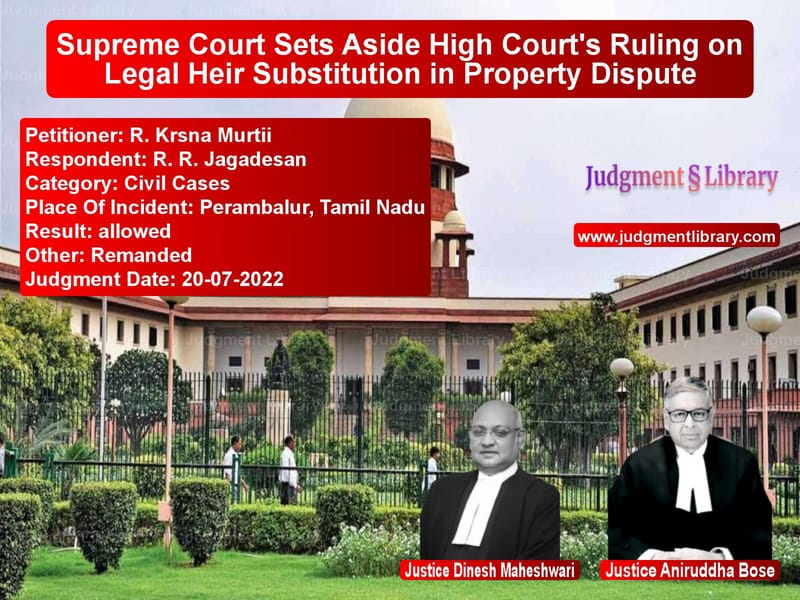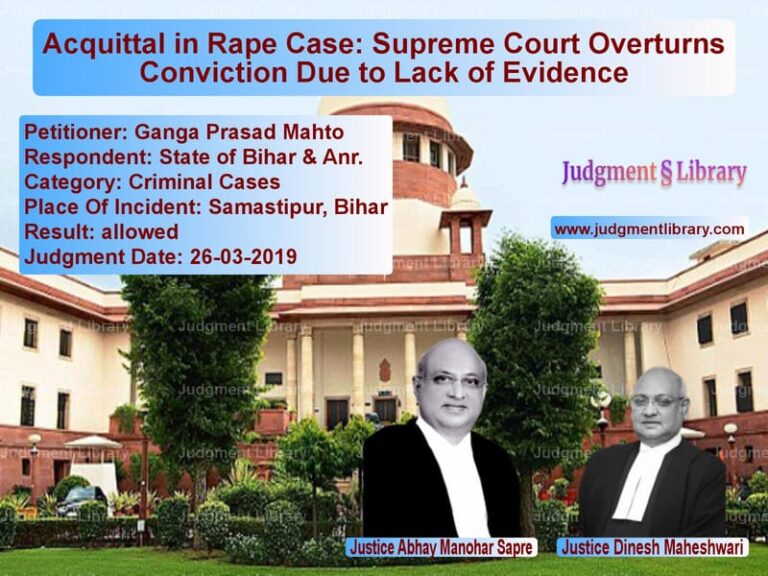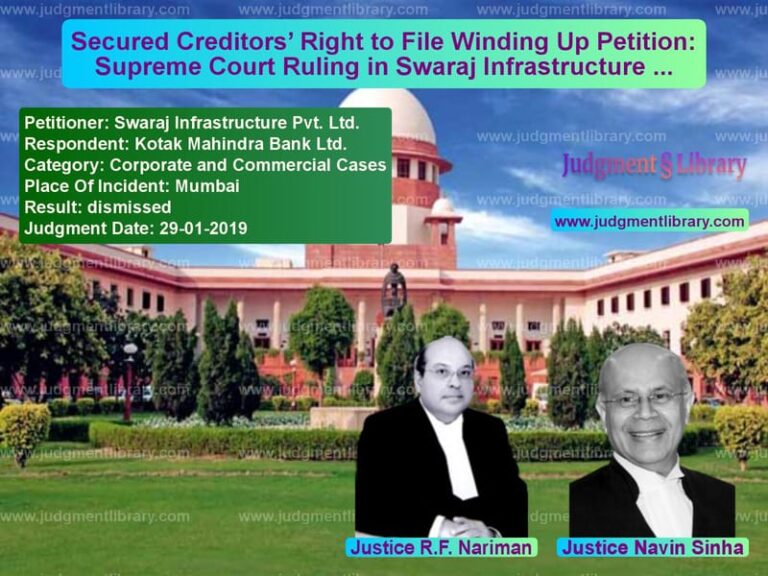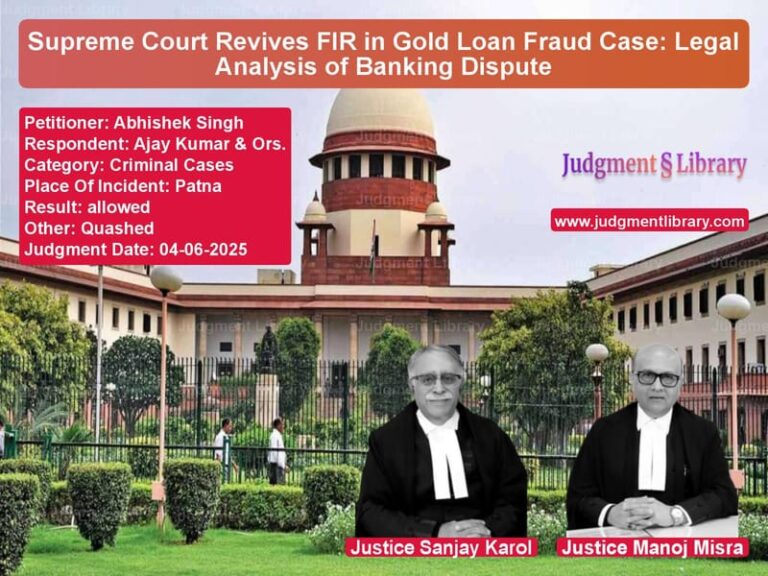Supreme Court Sets Aside High Court’s Ruling on Legal Heir Substitution in Property Dispute
In a significant ruling, the Supreme Court of India in R. Krsna Murtii vs. R. R. Jagadesan overturned a High Court decision concerning the substitution of legal heirs in a property dispute. The case revolved around the appellant’s right to be substituted as the legal representative of his deceased mother in an ongoing suit for declaration and possession.
Background of the Case
The appellant, R. Krsna Murtii, was the power of attorney holder of his mother, who had filed a suit seeking declaration and perpetual injunction or, alternatively, declaration and recovery of possession against the respondent, R. R. Jagadesan. The dispute concerned immovable property that was allegedly wrongfully occupied.
During the pendency of the suit, the plaintiff, i.e., the appellant’s mother, passed away on January 10, 2020. Following her demise, the appellant filed an application (I.A. No. 1 of 2020) in the Trial Court seeking substitution as the sole legal heir of the deceased plaintiff, citing a registered Will dated June 13, 2016, executed in his favor.
Trial Court’s Decision
The Subordinate Judge, Perambalur, dismissed the application on March 29, 2021, reasoning that:
- The deceased plaintiff had other legal heirs (another son and a daughter) whose rights in the suit property could not be ignored.
- The validity of the Will could not be decided at the stage of substitution.
As a result, the court held that the appellant could not be substituted as the sole legal heir and dismissed his application.
High Court’s Ruling
The appellant challenged the Trial Court’s decision by filing a revision petition before the Madras High Court. However, the High Court upheld the dismissal, stating that:
- The appellant should have taken steps to implead all legal heirs of the deceased plaintiff as co-plaintiffs or defendants.
- The substitution of a single heir was impermissible without considering the rights of other heirs.
- The appellant’s reliance on the Will required proper adjudication, which could not be done at the substitution stage.
Supreme Court’s Observations
The Supreme Court, comprising Justices Dinesh Maheshwari and Aniruddha Bose, examined the case in detail and made the following key observations:
- “The appellant is the son of the deceased plaintiff. His entitlement to be recognized as a legal heir, either through testamentary or non-testamentary succession, cannot be denied.”
- “The Trial Court and the High Court erred in dismissing the substitution application outright, rather than adopting a judicial inquiry into the validity of the appellant’s claim.”
- “If there were objections regarding the Will or the presence of other heirs, the Trial Court should have followed Order XXII Rule 5 of the Code of Civil Procedure (CPC), which allows for an inquiry into the matter.”
- “Dismissing the substitution application without examining the Will or conducting an inquiry was an erroneous approach that resulted in a miscarriage of justice.”
Final Judgment
The Supreme Court ruled in favor of the appellant, stating:
“The application made by the appellant for substituting himself as the legal representative of the deceased plaintiff could not have been declined outright by the Trial Court. The matter required proper adjudication as per law.”
Accordingly, the Court:
- Set aside the High Court and Trial Court’s orders.
- Restored the appellant’s substitution application for reconsideration by the Trial Court.
- Directed the Trial Court to conduct an inquiry under Order XXII Rule 5 of CPC to determine whether the appellant could be substituted as the sole legal heir.
Key Takeaways from the Judgment
- Right to Substitution: Legal heirs of a deceased plaintiff cannot be denied substitution outright if they have a valid claim.
- Importance of Inquiry: When disputes arise regarding the rightful legal representative, courts must conduct an inquiry rather than summarily dismissing the application.
- Application of CPC Rules: Order XXII Rule 5 provides a mechanism for resolving disputes over legal heirship, which must be followed.
- Procedural Fairness: Courts must ensure due process in succession-related disputes to avoid unnecessary delays and injustice.
Impact of the Judgment
This ruling is expected to have a significant impact on property disputes involving multiple legal heirs. It reinforces the principle that procedural fairness must be followed in substitution matters and that courts should not summarily reject applications without proper adjudication.
Conclusion
The Supreme Court’s decision in R. Krsna Murtii vs. R. R. Jagadesan underscores the importance of adhering to procedural law when dealing with succession disputes in civil cases. By allowing the appellant’s plea for reconsideration, the judgment ensures that legal heirs are not unfairly denied their right to pursue claims. This case serves as a critical precedent for future disputes involving similar succession issues in civil litigation.
Petitioner Name: R. Krsna Murtii.Respondent Name: R. R. Jagadesan.Judgment By: Justice Dinesh Maheshwari, Justice Aniruddha Bose.Place Of Incident: Perambalur, Tamil Nadu.Judgment Date: 20-07-2022.
Don’t miss out on the full details! Download the complete judgment in PDF format below and gain valuable insights instantly!
Download Judgment: r.-krsna-murtii-vs-r.-r.-jagadesan-supreme-court-of-india-judgment-dated-20-07-2022.pdf
Directly Download Judgment: Directly download this Judgment
See all petitions in Property Disputes
See all petitions in Succession and Wills
See all petitions in Landlord-Tenant Disputes
See all petitions in Damages and Compensation
See all petitions in Other Cases
See all petitions in Judgment by Dinesh Maheshwari
See all petitions in Judgment by Aniruddha Bose
See all petitions in allowed
See all petitions in Remanded
See all petitions in supreme court of India judgments July 2022
See all petitions in 2022 judgments
See all posts in Civil Cases Category
See all allowed petitions in Civil Cases Category
See all Dismissed petitions in Civil Cases Category
See all partially allowed petitions in Civil Cases Category







